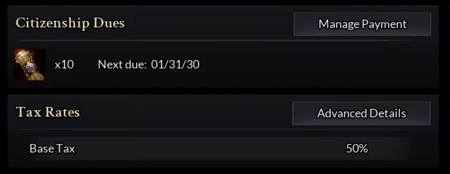Node governments
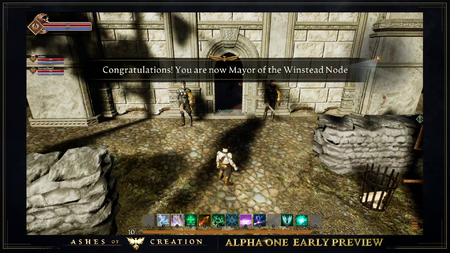
There are a number of different seats that can exist within a node, and carry different responsibilities.[2] – Steven Sharif
Positions within a node's government are attained through seasonal titles that grant special powers and benefits within the node.[3][2][4][5]
There are other node-based positions. Most of them relate to social organizational structures like the temple and the social organization building that the node might construct. Those are ladder systems of achievement that players can work through on a seasonal basis to achieve the highest level of that for the particular node; and by doing so they will then have titles bestowed upon them, which grants certain types of powers and benefits.[3] – Steven Sharif
- Prefeitos.[6]
- Priests, bishops, or acolytes of temples.[3][7][4]
- Social organization positions.[3]
- Patron guild leaders.[4]
- Chief bounty hunter.[4]
Election cycle
Node elections may occur on a monthly basis.[8]
Abilities
Government officials will have wide-ranging abilities to influence their node.[9]
- Mark foreign citizens of other nodes as enemies of the state.[10]
- Declare war on another node and rally citizens to the cause.[10]
- Node names will be predetermined. Governments may be able to choose the name from a list.[11]
Desenvolvimento de Base
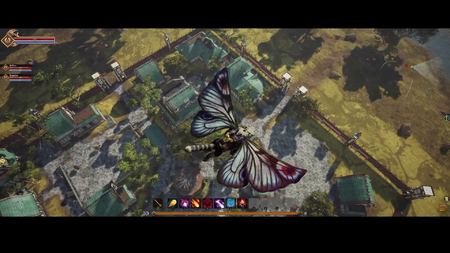
Já no terceiro estágio de evolução, como uma vila, é um layout razoavelmente grande; e parte desses layouts inclui domicílos essencialmente estáticos, dentro da base, que os jogadores podem comprar.[13] – Steven Sharif
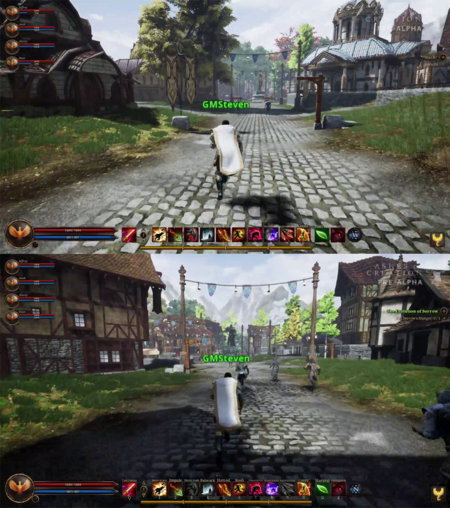
O layout e a arquitetura dentro da área de desenvolvimento de uma Base são determinados pela raça com mais influência. Por exemplo, uma Base em estágio 3 onde a maioria dos jogadores contribuíntes é Py'Rai terá uma vila Py'Rai com arquitetura Py'Rai. A maioria dos PNJs seriam elfos Py'Rai, e ofereceriam missões com narrativa Py'Rai.[15] – Margaret Krohn
A experiência contribuída por cada jogador é marcada com sua raça e outros identificadores. Quando uma Base evolui, a raça com a maior contribuição de experiência determina o estilo e cultura da Base. Essa mudança de estilo e cultura pode ocorrer em todo Estágio de Base. Por exemplo, se uma Base avança para o Estágio 2 - Acampamento e 51% de toda a experiência veio de jogadores Ren'Kai, a Base será uma Base Ren'Kai Estágio 2. Se essa mesma Base avançar para o Estágio 3 - Vilarejo, mas dessa vez os Py'rai tiverem contribuído 62% de tpda a experiência obtida, a Base se tornará uma Base Py'Rai Estágio 3. Influências culturais trazem mudanças além da estética e das missões - benefícios são dados àqueles da cultura dominante dentro da Zona de Influência daquela Base.[16] – Margaret Krohn
O layout e o estilo de uma Base são determinados por diversos fatores:[17]
- Localização da base.[17]
- Tipo de Base.[17]
- Raça que mais contribuiu para a evolução da Base.[17][18]
- Aparências raciais dos prédios e dos PNJs de uma Base.[19][18]
- Isso se aplica a todas as bases, incluindo bases de castelo.[20]
- O resto é determinado pelo prefeito da base.[17]
Algumas partes são determinadas pela área onde a base está. Outras, pelo tipo da base; certas partes são determinadas pela raça, e o resto é determinado pelo prefeito.[17] – Jeffrey Bard
Todas as bases, sejam elas relacionadas aos castelos ou não, têm influências culturais que são replicadas nas aparências dos prédios e dos PNJs presentes na Base.[20] – Steven Sharif
Existe uma mecânica de atrito que afeta a experiência e influência para impedir que uma única raça domine o mundo inteiro.[21]
Existe um atrito e esse atrito na experiência e influência aumenta de acordo com a performance da raça no mundo. Então se todas as bases forem de Orc, o nível de atrito deles será muito alto para competir com outras raças na hora de estabelecer a cultura de novas bases. Isso acontece pois já são muito influentes e existe uma opinião popular contra eles nas regiões que não influenciam.[21] – Steven Sharif
Impostos
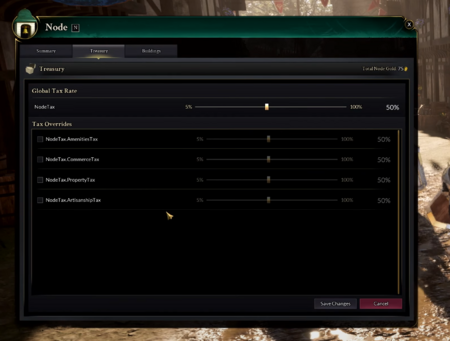
As the node levels up, you're gonna get access to deeper controls on the taxes, so that you as a Mayor can incentivize players to come to your node to do certain things. If you're a node that loves smithing, you're probably going to want to lower your taxes on artisanship to incentivize players to be here. But then you might want to drive up taxes on other avenues that players aren't necessarily coming to your node for, but are using out of convenience.[22] – Chris Justo
Prefeitos are able to set a generalized node tax rate as well as overrides for different activities within their node. Mayors gain additional taxation controls as their node advances.[22][23]
- Amenities tax override.[22]
- Artisanship tax override.[22]
- Commerce tax override.[22]
- This may include taxes that apply to tavern games.[24][25]
- Property tax override.[22]
- Freehold property taxes scale according to the number of freehold building permits issued for that freehold.[26][27][28]
- Citizenship dues and property taxes scale based on the stage of the node when a player became a citizen.[29][30][31][32][33]
- The goal is to exert financial pressure on node populations by making taxes increasingly expensive as nodes advance, rather than putting in place hard population caps.[31][32]
- Node tax rates will be visible on the world map by hovering over a node location.[34]
- Tax revenue only goes toward funding node development. This cannot be withdrawn by the mayor or any other player.[35][28]
Regent nodes take a cut of taxes from various activities that occur within their vassal node structure.[35][36]
- This tax doesn't necessarily impact the individual citizen, because citizen's tax levels are determined by their node, but the node's finances are affected by the taxation levied by its parent nodes.[36]
When a node reaches stage 3 (Vilarejo) and a player run government has formed, all player housing will pay taxes.[37]
- A player's tax charge will be determined by the number of structures built on their plot.[27][28]
- Freehold taxes are calculated based on the number of permits issued for buildings on a freehold.[38][39][26][27][28]
- Buildings that require permits will have additional upkeep costs.[38]
- Maintaining businesses requires licensing and payments to the node your Freehold is associated with. This permitting system allows for a certain number of buildings to be constructed on a Freehold. Permits can be obtained from the same node the Freehold was certified from, and buildings that require permits will have an additional upkeep cost.[38]
- Housing foreclosures result from failing to pay property taxes or other fees.[38]
Ver também
Referências
- ↑ Transmissão ao vivo, 2020-03-28 (1:02:46).
- ↑ 2.0 2.1
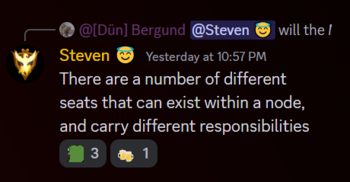
- ↑ 3.0 3.1 3.2 3.3 Transmissão ao vivo, 2023-09-29 (1:07:01).
- ↑ 4.0 4.1 4.2 4.3 Transmissão ao vivo, 2019-07-26 (1:20:48).
- ↑ MMOGames interview, January 2017
- ↑ Transmissão ao vivo, 2017-11-17 (9:49).
- ↑ Transmissão ao vivo, 2020-07-25 (1:52:45).
- ↑

- ↑

- ↑ 10.0 10.1 City hall.
- ↑

- ↑ Livestream, 19 May 2017 (36:09)
- ↑ 13.0 13.1 Transmissão ao vivo, 2020-06-26 (45:32).
- ↑ Transmissão ao vivo, 2018-02-09 (33:50).
- ↑ Blog - Know Your Nodes - The Basics.
- ↑ Blog - Know Your Nodes - Advance and Destroy.
- ↑ 17.0 17.1 17.2 17.3 17.4 17.5 Transmissão ao vivo, 2018-09-27 (53:06).
- ↑ 18.0 18.1 Entrevista, 2018-05-11 (54:34).
- ↑ Transmissão ao vivo, 2017-05-26 (21:23).
- ↑ 20.0 20.1 Entrevista, 2018-05-11 (47:27).
- ↑ 21.0 21.1 Entrevista, 2018-05-11 (1:00:19).
- ↑ 22.0 22.1 22.2 22.3 22.4 22.5 22.6 22.7 Vídeo, 2023-08-31 (28:04).
- ↑ Transmissão ao vivo, 2020-03-28 (1:03:38).
- ↑

- ↑

- ↑ 26.0 26.1 Entrevista, 2023-07-09 (54:46).
- ↑ 27.0 27.1 27.2 Transmissão ao vivo, 2023-06-30 (1:45:22).
- ↑ 28.0 28.1 28.2 28.3

- ↑ Blog: Development Update with Village Node.
- ↑ Transmissão ao vivo, 2023-08-31 (15:51).
- ↑ 31.0 31.1 Entrevista, 2023-07-09 (38:14).
- ↑ 32.0 32.1 Entrevista, 2020-03-27 (0:30).
- ↑ Vídeo, 2018-04-05 (41:48).
- ↑ Transmissão ao vivo, 2023-09-29 (1:11:22).
- ↑ 35.0 35.1 Transmissão ao vivo, 2022-08-26 (1:10:16).
- ↑ 36.0 36.1 Entrevista, 2018-05-11 (57:02).
- ↑

- ↑ 38.0 38.1 38.2 38.3 Blog: Exploring the Boundless Opportunities of Freeholds.
- ↑

